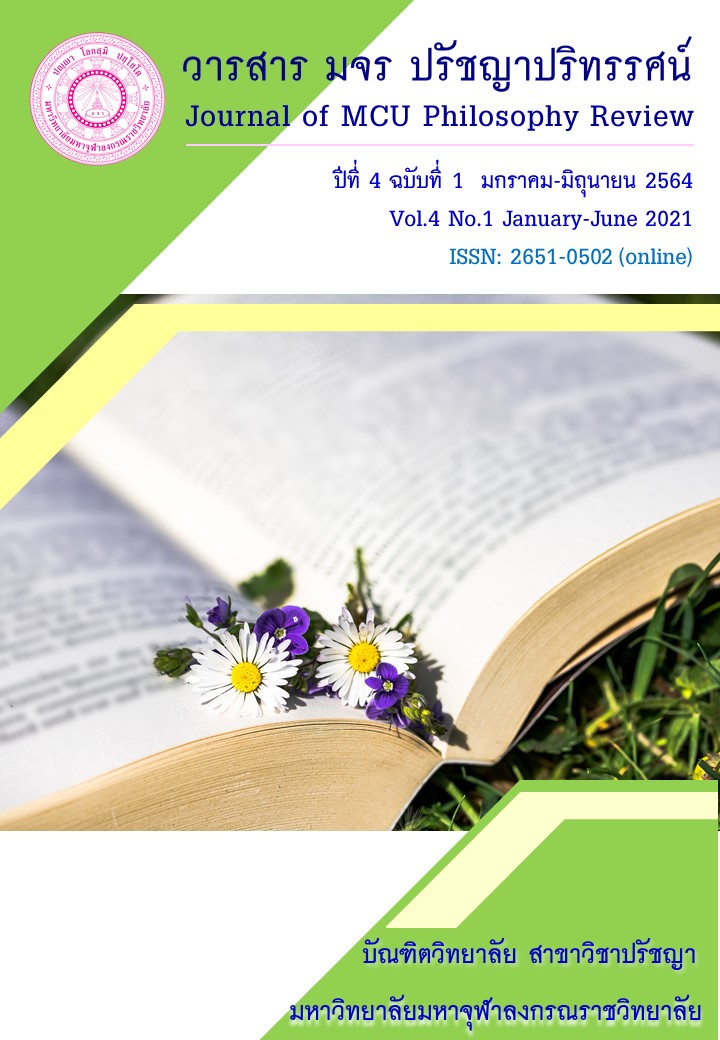An analytical study of the passive euthanasia with respect to the concept of autonomy in principles of Biomedical ethics and Bodhicitta
Main Article Content
Abstract
In this article, the main objectives were purposely made: 1) to study passive euthanasia with respect to the concept of autonomy in the principle of Biomedical ethics, 2) to study the concept of autonomy in the principle of Bodhicitta, and 3) to critically analyze passive euthanasia with respect to the concept of autonomy in the principles of Biomedical Ethics and the Bodhicitta principle. This is documentary research.
In the research, it was clearly found that the principle of treatment in dealing with patients to provide them with the state of well-being in accordance with the principle of Biomedical ethics basically requires the health professionals to pay respect to patients’ consent in prolonging life because peaceful death is the state of well-being caused by the reasons and patients’ making decision. Unfortunately, the Biomedical professionals do not take such well-being into the proper consideration. By virtue of the mentioned lack of taking it into account, the reliability toward the access of well-being comes to call into question. The Biomedical professionals ought to treat the patients in accordance with their consent and thereby qualifying as not intervening through the Biomedical ethics concerning with the making decision based on non-maleficence principle and do no harm principle. Viewed from this angle, benefiting and non-maleficence do not come from the ground of intention only but from various factors as was explained by Mahayana Buddhism. In this respect, Zen Buddhism proposed that the practical principles leading human beings to the nature of Buddhahood require one who is supposed to provide the great help to respect the decision made by man in a society because the Buddhahood is the state that uniquely enlightens man with the Buddhahood caused by insight in daily life.
Article Details
บทความที่ได้รับการตีพิมพ์เป็นลิขสิทธิ์ของวารสาร มจร ปรัชญาปริทรรศน์
ข้อความในบทความที่ได้รับการตีพิมพ์ในวารสาร ถือเป็นความรับผิดชอบของผู้เขียนบทความ และข้อคิดเห็นนั้นไม่ถือว่าเป็นทัศนะและความรับผิดชอบของกองบรรณาธิการวารสาร มจร ปรัชญาปริทรรศน์
References
จนเจน เจนหัตถกิจ. (2538). บันทึกของท่านรินไซ. กรุงเทพมหานคร: ธรรมสภา.
ฉัตรสุมาลย์ กบิลสิงห์. (2553). ประเทศจีนกับพระพุทธศาสนา (ฝ่ายมหายาน). กรุงเทพมหานคร: โรงพิมพ์มหามกุฎราชวิทยาลัย.
ประพจน์ อัศววิรุฬหการ. (2557). โพธิสัตวจรรยา: มรรคาเพื่อมหาชน. กรุงเทพมหานคร: คณะอักษรศาสตร์ จุฬาลงกรณ์มหาวิทยาลัย.
พระมหายุทธนา นรเชฏโฐ. (2553). สภาวะของพระพุทธเจ้าหลังการปรินิพพาน. กรุงเทพมหานคร: โรงพิมพ์มหาจุฬาลงกรณราชวิทยาลัย.
ไพโรจน์ อยู่มณเฑียร. (2556). ท่านเหว่ยหลาง. กรุงเทพมหานคร : แปลนพริ้นติ้ง.
เริงฤดี ปธานวนิช. (2550). องค์ประกอบของทุรเวชปฏิบัติ. วารสารกฎหมายและสาธารณสุข 3(2)
วิฑูรย์ อึ้งประพันธ์. (2548). จากจรรยาแพทย์มาถึงยุคชีวจริยศาสตร์.กรุงเทพมหานคร: วิญญูชน.
สมเด็จพระญานสังวร. (2553). ปัญญาในพระพุทธศาสนา. กรุงเทพมหานคร: โรงพิมพ์มหามกุฎราชวิทยาลัย.
สมภาร พรมทา. (2550). พระพุทธศาสนานิกายเซนการศึกษาเชิงวิเคราะห์. กรุงเทพมหานคร : โรงพิมพ์แห่งจุฬาลงกรณ์มหาวิทยาลัย.
สันต์ หัตถีรัตน์. (2542). สิทธิที่จะอยู่หรือตาย. กรุงเทพมหานคร: สำนักพิมพ์หมอชาวบ้าน.
สิวลี ศิริไล. (2552). ปัญหาปรัชญาในการแพทย์. กรุงเทพมหานคร : คณะสังคมศาสตร์และมนุษยศาสตร์.
สุมาลี มหณรงค์ชัย. (2550). พุทธศาสนามหายาน. กรุงเทพมหานคร: สำนักพิมพ์สยาม.
สุวรรณา สถานอานันท์. (2534). ภูมิปัญญาวิชาเซ็น. กรุงเทพมหานคร: สำนักพิมพ์สยาม.
สุวรรณา สถาอานันท์. (2534). มนุษย์ทัศน์ในปรัชญาตะวันออก. กรุงเทพมหานคร: สำนักพิมพ์จุฬาลงกรณ์มหาวิทยาลัย.
เสถียร โพธินันทะ. (2518). ปรัชญามหายาน. กรุงเทพมหานคร: สำนักพิมพ์บรรณาคาร.
เสถียร โพธินันทะ. (2543). วิมลเกียรตินิทเทสสูตร. กรุงเทพมหานคร: มหามกุฎราชราชวิทยาลัย.
Beauchamp and Walters.LeRoy. (2003). Contemporary in Bioethics. New York: Wadworth-Thomson Learning.
Beauchamp T.L and Childress. James F. (1994). Principles of Biomedical Ethics. New York: Oxford University Press.
Chen Chi. Chang. (1959). The Practice of Zen. New York: Harper and Brother.
Florida. Robert E. (1998). The Lotus Sutra and Health Care Ethics: in Journal of Buddhist Ethics.
Jame Rachels. (2001). Active and Passive Euthanasia. in Bioethics An Anthology.
John Harris. Helga Kuhse(Edited). (2001). The Survival Lotterry in Bioethics An Anthology. Massachusett : Blackwell.
Ray Moynihan et al. (2002). Selling sickness: the pharmaceutical industry and disease mongering BMJ.
Robert Baum (ed.) R.B. Schiffer. (1976). The Concept of Death. in Ethical Arguments for Analysis 2ed. New York: Holt Rinehart and Winston.
Wanna Beck AT. et al. (1978). Cognitive Therapy of depression. New York: Guild Press.
Wesley D Smith. (1994). Hippocrates Volum VII. Massachuseth: Harvard University Press.
WHO. (2001). Basic cocument. 43rd Edition. Geneva: World Health Organization.


